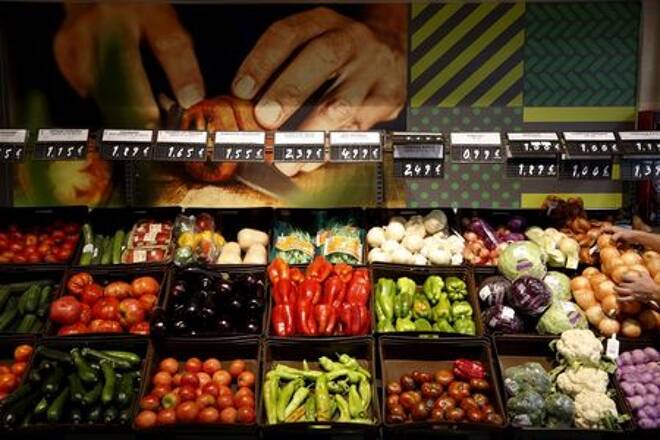Advertisement
Advertisement
World Food Prices Fall in June for First Time in a Year – FAO
By:
ROME (Reuters) - World food prices fell in June for the first time in 12 months, pushed lower by declines in vegetable oils, cereals and dairy products, the United Nations food agency said on Thursday.
The Rome-based FAO also said in a statement that worldwide cereal harvests would come in at nearly 2.817 billion tonnes in 2021, slightly down on its previous estimate, but still on course to hit an annual record.
The Food and Agriculture Organization’s food price index, which measures monthly changes for a basket of cereals, oilseeds, dairy products, meat and sugar, averaged 124.6 points last month versus a revised 127.8 in May.
The May figure was previously given as 127.1.
On a year-on-year basis, prices were up 33.9% in June.
FAO’s vegetable oil price index plunged 9.8% in June, partly on the back of a fall in palm oil prices, which were hit by expectations of output gains in leading producers and a lack of fresh import demand. Soy and sunflower oil quotations also dropped.
The cereal price index dropped 2.6% in June month-on-month, but was still up 33.8% year-on-year. Maize prices fell 5.0%, partly because of higher-than-expected yields in Argentina and improved crop conditions in the United States.
International rice prices also fell in June, touching 15-month lows, as high freight costs and container shortages continued to limit export sales, FAO said.
Dairy prices dipped 1.0% on a monthly basis, with all components of the index easing. Butter recorded the largest drop, hit by a rapid decline in global import demand and a slight increase in inventories, especially in Europe.
The sugar index posted a 0.9% month-on-month gain, reaching its highest level since March 2017. FAO said uncertainties over the impact of unfavourable weather conditions on crop yields in Brazil, the world’s largest sugar exporter, pushed prices up.
The meat index rose 2.1% from May, with quotations for all meat types rising as increases in imports by some East Asian countries compensated for a slowdown in China’s meat purchases.
FAO said the slight fall in its estimate for world cereal production this year was principally triggered by a sharp cut to the Brazilian maize production forecast as prolonged periods of dry weather weighed on yield expectations.
Global wheat production prospects also retreated this month, as dry weather in the Near East hurt yield prospects there. By contrast, the forecast for global rice output in 2021 edged up.
The forecast for world cereal utilization in 2021/22 was cut by 15 million tonnes from the previous month to 2.810 billion tonnes, still 1.5% higher than in 2020/21.
World cereal stocks by the close of seasons in 2021/22 are now expected to rise above their opening levels for the first time since 2017/18. “Higher maize stocks foreseen in China account for the bulk of this month’s upward revision to world cereal inventories,” FAO said.
For a look at all of today’s economic events, check out our economic calendar.
(Editing by Crispian Balmer)
About the Author
Reuterscontributor
Reuters, the news and media division of Thomson Reuters, is the world’s largest international multimedia news provider reaching more than one billion people every day. Reuters provides trusted business, financial, national, and international news to professionals via Thomson Reuters desktops, the world's media organizations, and directly to consumers at Reuters.com and via Reuters TV. Learn more about Thomson Reuters products:
Advertisement
